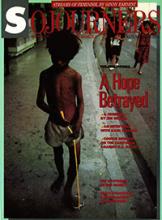Cookie Diokno was chair of the Regional Council for Human Rights in Asia and secretary general of the Free Legal Assistance Group (FLAG), a nationwide network of human rights lawyers in the Philippines, when this article appeared. She was also a leader in the Anti-Bases Coalition (ABC), an organization working for the removal of the U.S. bases--Subic Naval Base and Clark Air Force Base--from the Philippines.
The ABC was founded by her father, Jose Diokno, a well-known and widely respected senator and Philippine nationalist who died last year of cancer. Several years ago Cookie Diokno had planned to travel abroad but was denied a passport by the Philippine government; her father suggested that she work with him for awhile. "That 'awhile' lasted 14 years," she says.
Cookie Diokno was interviewed by Jim Wallis in Manila.
--The Editors
Jim Wallis: Tell us about the anti-bases campaign.
Read the Full Article

